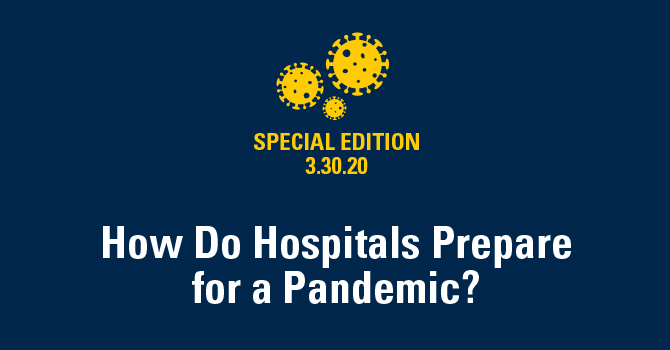How Do Hospitals Prepare for a Pandemic?

As coronavirus spreads in hotspots like New York City, New Orleans, Chicago and Detroit, hospitals are operationalizing their personnel and resources to meet the demands of caring for the sick. News coverage is sounding the alarm on supply shortages and overburdened health care workers. In the complex world of health care, how do hospitals prepare for and react to something like the coronavirus? David Hutton, associate professor of Health Management and Policy at the University of Michigan School of Public Health, discusses what's happening on the ground to take care of patients.
Listen to "How Do Hospitals Prepare for a Pandemic? 3.30.20" on Spreaker.
|
Subscribe and listen to Population Healthy on Apple Podcasts, Spotify, Google Podcasts, iHeartRadio, YouTube or wherever you listen to podcasts! Be sure to follow us at @umichsph on Twitter, Instagram, and Facebook, so you can share your perspectives on the issues we discussed, learn more from Michigan Public Health experts, and share episodes of the podcast with your friends on social media. |
Speaker 1: By now you've probably heard a lot about hospitals and health systems not having enough supplies or staff to handle the significant increase in patients expected from the coronavirus pandemic. But even when we're not facing a global pandemic, influxes in patients happen fairly regularly, and there's a lot hospitals have already been doing to prepare. What makes this situation different, and how are they responding? And what does this mean for you if you or your loved ones end up needing treatment for coronavirus?
Hello and welcome to Population Healthy, a podcast from the University of Michigan School of Public Health. This episode is part of a series of special editions of our podcast, focusing on the ongoing coronavirus pandemic. To better understand all of this, we talked with David Hutton, an associate professor of Health Management and Policy at the University of Michigan School of Public Health, and an expert in mathematical modeling of diseases and pandemic planning.
Hutton: Hospitals are trying to plan to be prepared for a lot of different events, so they wanna make sure that they have surge capacity in many different areas. That's equipment, that’s space, that's staff, finding ways to be able to take advantage of those things.
One of the challenges with the coronavirus outbreak is that if everyone is asking for that increased capacity at the same time, we run into some problems. If hospital A was expecting to have hospital B help them out in time of crisis, well if hospital B is facing the same coronavirus crisis, now they're both kind of in trouble. Same thing with other equipment, like personal protective equipment, masks and respirators. It can be more challenging, when this is something it has everyone all at once.
I think there would be a few challenges. One, hopefully, a lot of elective procedures will be postponed to expand capacity to handle other things. But you can imagine that if your ICUs get filled with coronavirus patients, that's fewer patients who can be seen who might be having another emergency like heart attack or a stroke, or maybe they were getting their chemotherapy and they had an adverse reaction, and so then they needed to go to the ICU. That capacity can fill up and then take away capacity from other patients who might need it for other normal non-pandemic related health care needs. Another thing that can be a problem is if staff are getting sick, and we're seeing this around the world in China and Italy and other places, and so then they become sick and then you can reduce your capacity to handle patients if the staff are getting sick. So that's another way that the hospital capacity can be diminished and the other patients can be affected by their suffering.
Hospitals are looking at a lot of different creative ways of expanding their capacity to help patients. I know we're concerned about the number of respirators that we have, considering using them for longer periods of time then we initially thought. I’ve heard reports out of University of Nebraska Medical Center where they're using ultraviolet light to decontaminate respirators and be able to reuse these respirators that traditionally we be thought of as one-time use devices. There are a lot of new creative ways we normally wouldn't think of when we're in this urgent crisis situation.
Speaker 1: With all of the challenges hospitals are facing in preparing for the surge in patients, and then talk of limited beds and staff and supplies, it's pretty scary to think about actually needing to go to the hospital right now. So if someone does contract coronavirus and needs care in a hospital setting, what can they expect?
Hutton: If you had coronavirus, the good news is, a lot of these coronavirus infections are asymptomatic, and so you might not have any symptoms. And that's why we say you need to be really careful so if you do have that asymptomatic infection, you're not an incubator growing the virus and spreading it to other people. Other people are going to have symptoms. The good news there also is that a majority of the people who have symptoms do not need to be hospitalized. But when we compare this to something like the regular seasonal flu, a much larger fraction of the population does end up needing hospitalization and potentially ICU care.
That's where things become more complicated and what happens if you need to be hospitalized really depends on what everyone else does. If we're doing the right things with social distancing, we can as people say “flatten that curve” and hopefully reduce the need for ICU care. If you are ill and you need to be hospitalized, you can go to the hospital. If the hospitals aren’t overburdened, I think you can actually get very good care and seen by emergency physicians potentially spend some time in the hospital if needed, be sent to the ICU, and be treated potentially with intubation and ventilation. Many people can spend quite a bit of time in there, maybe even a couple of weeks in the hospital, of course, that's gonna vary person to person.
That's kind of the good case if we don't overburden our healthcare system, but if we don't do very good social distancing and the hospitals are overwhelmed with patients, that's when things become more complicated. Patients might be sent to an alternate hospital, they might be sent to a makeshift temporary hospital in another building or something like that, if we're experiencing an overburdened healthcare system. And unfortunately, as we're seeing in places like Italy, it sounds like there are some places where the ICUs are overburdened, and the medical staff are having to make very difficult decisions about who gets on ventilators or not. So, that's why everyone's been saying for the past few weeks that it's really important for us to do the social distancing to make sure we don't overburden our hospitals.
Speaker 1: This has been a special edition of Population Healthy, a podcast from the University of Michigan School of Public Health. During the ongoing coronavirus pandemic, we’ll work to bring you analysis from our community of experts to help you understand what this public health crisis means for you. To stay up-to-date in between special edition episodes, be sure to check out our website publichealth.umich.edu, subscribe to our Population Healthy newsletter at publichealth.umich.edu/news/newsletter and follow us on Twitter, Instagram, and Facebook @umichsph.
In This Episode
 David Hutton
David Hutton
Associate Professor, Health Management and Policy
David Hutton is an associate professor of Health Management and Policy with a background in economics, engineering, and health policy modeling. He is an expert in mathematical modeling of diseases and pandemic planning, and is interested in interventions with uncertain or complex outcomes. Learn more.
